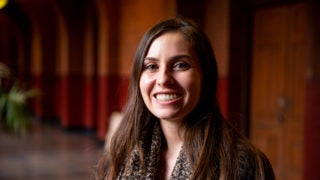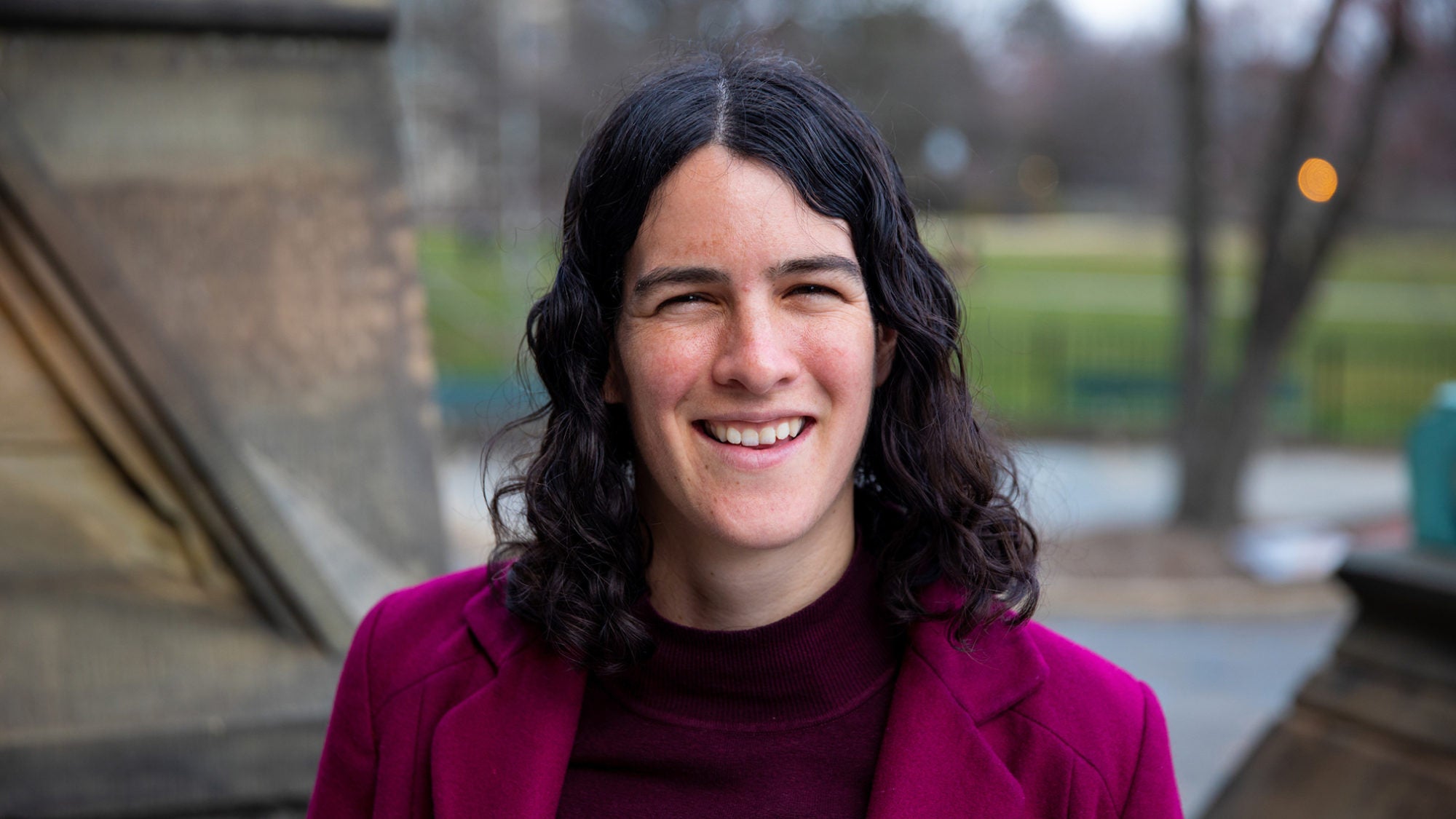
Title: Alumna’s Journey to Help Mexican Border Immigrants Inspired by Relationships
Joanna Williams (SFS’13), director of education and advocacy for the Kino Border Initiative (KBI), worries that the plight of migrants on the Mexican border is becoming invisible.
“Two years ago, there was a lot of attention to the border,” says Williams, who works for KBI in Nogales, Arizona and Nogales, Sonora, Mexico. “Even this past summer, people were outraged by family separation and by kids in cages. But what’s happening right now is just as outrageous, it’s just much more invisible.”
She says America has “effectively dismantled access to the legal protection of asylum for those fleeing persecution in their communities,” and that it is incumbent on people in the United States to stay informed and advocate for more humane and just immigration policies.
More Than Their Problems
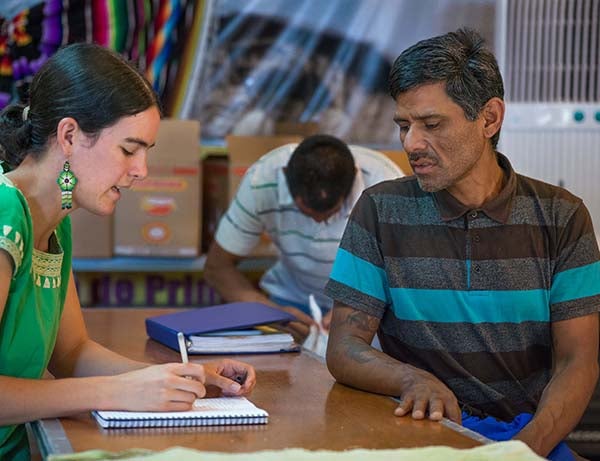
Every day, Williams, who began her job at KBI in 2015, bears witness to forced returns of people who were trying to flee persecution and the constant separation of families.
While Williams sometimes goes home to Tuscon, Arizona, feeling angry and weighed down, she is also often inspired.
“There is a family from Guatemala that has been stranded for several months here in Nogales, and I watch how they love each other and support each other,” says Williams, who previously worked as a border litigation project coordinator for the ACLU in Arizona. “The people that are here are more than their problems.”
KBI Statistics
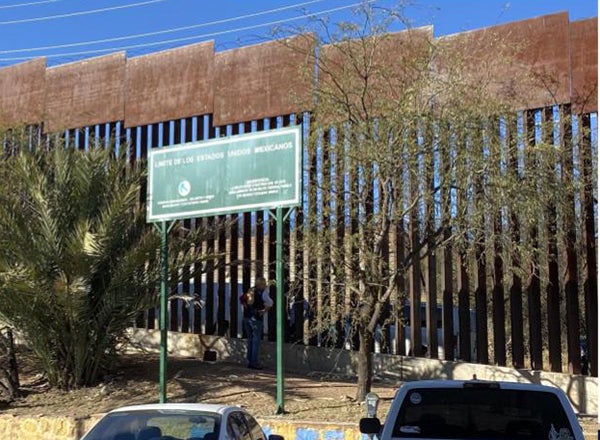
Inaugurated in 2009 by six organizations from the United States and Mexico, including two Society of Jesus provinces, KBI’s vision is to promote humane and just migration policy and it works towards that vision through humanitarian assistance, education, and advocacy
In 2019, 567 people who arrived to KBI reported that they were separated from children living in the US as a result of their deportation.

In 2018, KBI and several other entities interviewed 133 deportees from the U.S. at its migrant shelter in Nogales, Sonora. The report revealed that survey respondents had lived an average of nearly 20 years in the United States. About 96% were employed in the U.S. and 78 % had children who were U.S. citizens.
“What we saw between 2016 and 2017 was a doubling in the number of people who are deported away from their U.S. citizen children,” Williams notes.
Animating Communities
Williams works with a team on education and advocacy at KBI.
“The goal is to touch people in the U.S. and Mexico, to create transformation through direct encounter, and through that transformation animate communities to action in their own context.” says Williams, who participated in Georgetown’s Magis Kino-Border Immersion trip as a student.
Georgetown’s Center for Social Justice Research, Teaching and Service (CSJ) and Campus Ministry coordinate the alternative break learning trip, which immerses students in the communities, cultures and issues along the Arizona-Mexico border.
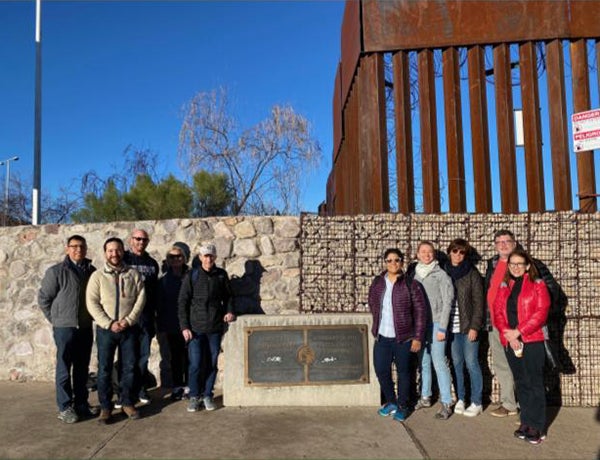
CSJ also recently created a similar immersion experience for university faculty and staff.
Williams facilities these immersion groups as well as groups from other colleges and high schools, and engages decision-makers in Washington to advocate for better immigration policies.
Catholic Perspective
While KBI, which just opened a new building with 140 beds for migrants, is providing shelter, two meals a day and clothing, Williams says its work is “much more encountering folks in our shared humanity”
“We do this from a Catholic perspective, recognizing or encountering Jesus in each person and then doing the best we can to journey alongside them as they make their decisions,” says Williams, who was married in 2015 by Georgetown professor Rev. Matthew Carnes, S.J. at Santa Cruz Parish in Tucson, Arizona.
She met her husband, Matthew Williams, when she volunteered at KBI in 2011.
University Support
Williams was recently was on campus to give the Bernardin Lecture, and prepared for the talk by looking at her student notes from meetings for what became Hoyas for Immigrant Rights, a student immigration rights group.
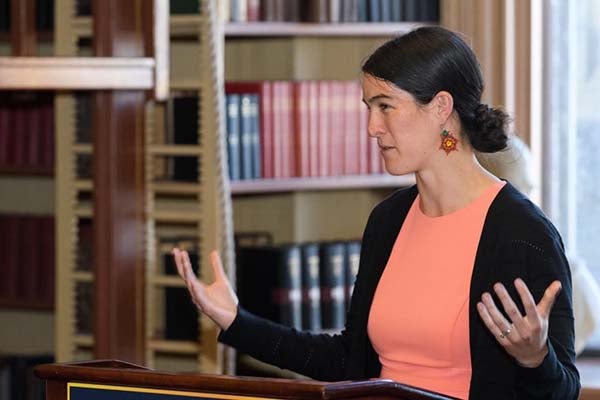
“I realized that at the time the university had spoken out really strongly in support of the DREAM act and then was also doing a lot quietly to support undocumented students on campus,” she notes. “I think it’s been extraordinary since that moment to see how Georgetown has made some of these resources more public and created a position specific for that accompaniment.”
Georgetown has a full-time associate director for undocumented resources and has spoken out numerous times and joined amicus briefs in support of undocumented students, DACA and the DREAM act.
Undergraduate Career
Williams, who was both a Truman Scholar and a Carroll Fellow at Georgetown, worked for the university’s Institute for the Study of International Migration, where she wrote briefs on migrants in crisis for use at the UN High-level Dialogue on International Migration.
She also participated in the university’s Kalmanovitz Initiative for Labor and the Working Poor’s Day Laborer Exchange.
And during the summer of her junior year, she worked in a migrant shelter in Veracruz documenting migrant information and incidences of human rights abuse for Central American migrants in Mexico.
After graduation, she volunteered with the Jesuit Refugee Service, where she prepared an advocacy report on abuses against Central American migrants in transit through Mexico.
She later won a Fulbright García Robles award to study immigration in Mexico, and received her Master’s in Public Policy from Arizona State University in 2019.
A Professor’s View
“The Kino Border Initiative’s motto of ‘Humanize – Accompany – Complicate’ owes much of its force and substance to Joanna,” says Carnes, who first taught Williams in her sophomore year. “She was fundamental to formulating it, and she has brought it to life for thousands of students and faculty from around the United States who have sought to understand the migrant journey.”
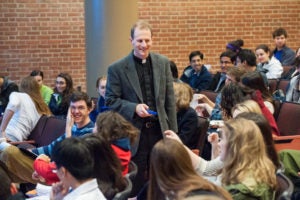
He also said that Williams “gets” Jesuit education.
“Joanna fully embodies a life of careful reflection, discernment and action, and she has willingly embraced a path of humble solidarity, accompaniment, advocacy and friendship with people on their migrant journeys,” the professor adds.
Early Immigrant Advocate
Williams was only in middle school when she realized she wanted to help immigrants to the United States.
Most of her friends when she was growing up in Denver, Colorado, were either from Mexico or had parents from Mexico, and she got the chance to connect with them and their families by eating meals and spending time together.

“That’s what motivated me to start learning Spanish – because I wanted to be able to speak to my friends’ parents,” says Williams, who is now fluent in the language. “When I understood that my friend’s mom had been undocumented for many years I learned it was a really big deal when she got her green card.”
“This shaped my understanding of immigration through the lens of folks that I was close with,” the alumna explains. “I think it’s been a theme throughout this work is that the relationships of love invite us to the next step in the journey of solidarity.”

